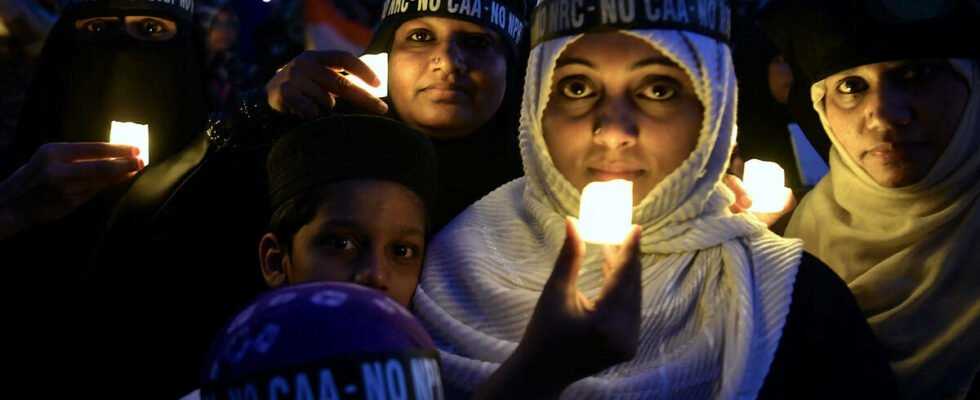Every morning, for a week, the same drama is repeated in the west of the state of Karnataka in southern India: supervisors and school principals stand in front of the doors of their establishment and force young Muslim women to take off their veil. Thousands of students, aged 10 to 18, are thus forced to choose between the religious tradition inherited from their parents and their desire to study. Most refuse this blackmail and are therefore turned back, like this 17-year-old young woman with veiled face and hair, from the town of Udupi. “We were told that we could not sit in class with the hijab, she explains on the phone, sobs in her voice, wishing to remain anonymous. My friends and I therefore refused to enter. Why are they suddenly changing the rules? Is this normal, when we have our exams next week?
In India, unlike France, religious symbols are accepted at school, and Sikhs can, for example, wear their turban. But in this state of Karnataka, led by the Hindu nationalists of the Bharatiya Janata Party (BJP), which has 13% Muslims, Hindus are pushing to ban the Islamic veil.
Saffron scarves, the color of militant Hinduism
It all started in early January, when twelve high school girls with veiled hair from Udupi were refused entry to class, out of concern “uniformity”, depending on the direction. Seven of them then lead a sit-in for several weeks in the corridor, to protest against this arbitrary exclusion. Quickly, Hindu groups counter-attack on the religious ground, and hundreds of students from many regional establishments arrive with saffron scarves, the color of militant Hinduism. In early February, clashes between Hindus and Muslims broke out, causing many injuries, and secondary schools closed for several days.
Since then, religious polarization has spread throughout this southern state, which has become a new bastion of political Hinduism. The establishments reopened last week and their directors, zealous or afraid to go against the political majority, impose the ban on the veil more widely. The regional government also bans the wearing of the hijab in state-funded Muslim schools, even though it is part of the official uniform of these establishments.
Election weapon
Schools in Madhya Pradesh and Uttar Pradesh, also run by the BJP, have also started banning it. And this Hindu-Muslim debate is taking place at the national level, when regional elections are taking place in five states, including Uttar Pradesh. This feeds the stigmatization of Muslims, an electoral weapon regularly used by the BJP to attract the Hindu vote: these students are indeed presented as retrograde because they would prefer their veil rather than their education, while it is the state institutions that have changed arbitrarily the rules for integrating this minority.
Several students have appealed to the regional court of appeal to defend their “fundamental right” to go to class veiled, and a decision on the merits is expected in the coming days. The government of Karnataka has already affirmed on Friday that the wearing of the veil is not “not an essential practice in Islam” and that these restrictions therefore did not violate the constitutional right of these students to free religious expression.
